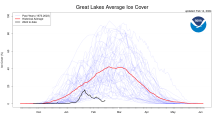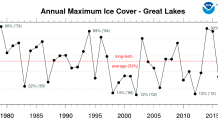We are two weeks into February and every day this month so far has reached 40 degrees. That hasn’t happened in February in Chicago in the last 142 years.
As this mild winter continues, Thursday marks the 27th consecutive day without any measurable snowfall.
This winter is currently tied for the fifth-warmest on record, and there are even more warm days in the forecast.
This is significant because the top five warmest winters were recorded when the official site was located in downtown Chicago, closer to the milder lakefront temperatures. It wasn’t moved to O’Hare Airport until 1942.
"Meteorological winter” ends at the end of February, so we’ll know where winter 2023-24 ranks after Feb. 29.
Warmer winter months also means less ice cover across the Great Lakes, and ice cover is currently at record lows. Through Feb. 14, the Great Lakes total ice cover is only 4.03%. The average is between 40-45% at this point in the season.
Lake Michigan ice cover is less than 3%, and that average is around 30% at this point in the season.


Reduced ice cover can bring physical and ecological changes to the Great Lakes. Less ice cover can create heavier and more organized bands of lake effect snow. This could also be lake effect rain as temperatures are rising over land as well. Cold-water fish species may have to compete with warmer-water species that have migrated farther north. Plankton and fish eggs could also be in danger without the protection of a layer of ice.
Feeling out of the loop? We'll catch you up on the Chicago news you need to know. Sign up for the weekly Chicago Catch-Up newsletter here.
Local
Less ice during winter obviously means the water is already warmer than normal by the time we get to spring. Water temperatures usually rise higher by the fall after a previous winter with below-normal ice production.
Warmer water leads to higher evaporation rates, and eventually lower lake levels. Some scientists are concerned this could lead to a continued fall in the levels of the Great Lakes going forward, but there are other important variables like precipitation.
The mild weather this winter feels nice outside, but the warmth may disrupt our environment more than we realize.



